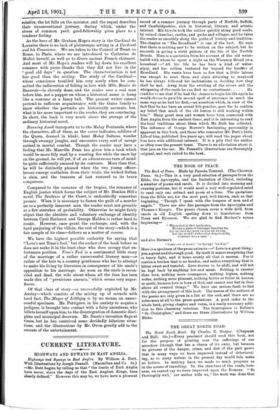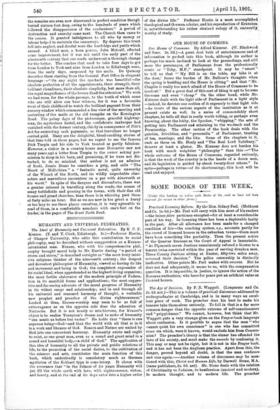THE GREAT NORTH ROAD.
The Great North Road. By Charles E. Harper. ' (Chapman and Hall. 32s.)—Every pessimist should read this book, not for the purpose of gloating over the sufferings of our ancestors (though that has a charm of its own), but because its pictures of the danger, crime, and dirt of the past prove that in many ways we have improved instead of deteriorat- ing, as so many writers in the present day would fain make us believe. In nothing have we made so much progress as in the means of travelling. In the structure of the roads, how- ever, we cannot say we have improved upon the Romans. "So thoroughly well," our author tells us, "the work was done that the remains are even now discovered in perfect condition though buried sixteen feet deep, owing to the hundreds of years which followed the disappearance of the roadmakers." A period of destruction and anarchy came next. The Church then came to the penile. It granted indulgences to all who by money or labour helped to maintain the causeways. By degrees this trust fell into neglect, and direful were the hardships and perils which ensued. A blind man, a born genius, John Metcalf, effected some improvement, but it was not until the early part of the nineteenth century that our roads underwent a thorough change for the better. The coaches that used to take four days to get from London to York and nine from London to Edinburgh were, Irons the early days, surpassed by the mails. De Quincey describes them starting from the General Post Office in eloquent language :—" On any night the spectacle was beautiful—the absolute perfection of all the appointments, their strength, their brilliant cleanliness, their absolute simplicity, but more than all, the royal magnificence of the horses fixed the attention." We wish we had room for the whole passage, to the truth of which some who are still alive can boar witness, for it was a favourite treat of their childhood to watch the brilliant pageant from their nursery window which commanded a fine view of the meeting and restarting of the mails at the old turnpike on the Kensington Road. The palmy days of the picturesque, graceful highway- man, the mysterious hostel, and the confederate innkeeper had vanished with the former century, chiefly in consequence of Pitt's Act for restricting cash payments, so that travellers no longer carried gold. Many are the delightful, blood-curdling stories of that time told in these pages, but we regret to see the famous Dick 'Turpin and his ride to York treated as partly fabulous. However, a visitor in a country house near Doncaster saw not many years ago a letter from Turpin to the owner asking. per- mission to sleep in his barn, and promising, if he were not dis- turbed, to do no mischief. Our author is not an admirer of Scott, Jeanie Deans he considers a prig, and calls "The Heart of Midlothian" a "fantastic novel, quite unworthy of the Wizard of the North, and its wildly improbable char- acters and marvellous encounters on a par with Ainsworth at his worst." In spite of the dangers and discomforts, there was a greater interest in travellieg along the roads, the scenes of many battlefields and pausing in the towns, with their fine old houses and grand churches, than there is in whizzing past them at forty miles an hour. But as we are now in too great a hurry or too lazy to see these places ourselves, it is very agreeable to read of them, in a comfortable armchair with one's feet on the fender; in the pages of The Great North Road.







































 Previous page
Previous page